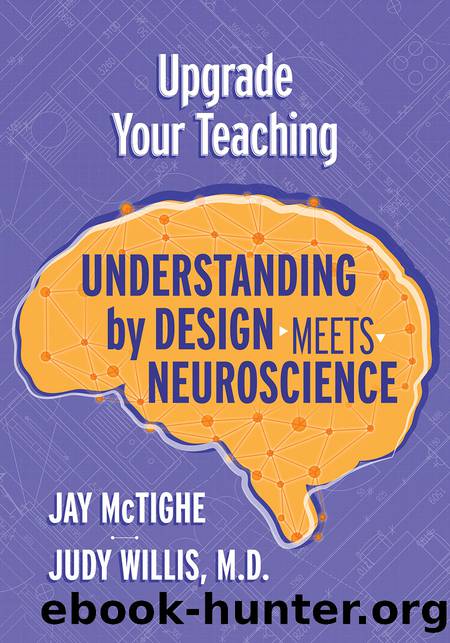Upgrade Your Teaching by McTighe Jay;Willis Judy;

Author:McTighe, Jay;Willis, Judy; [McTighe, Jay]
Language: eng
Format: epub
Publisher: Association for Supervision & Curriculum Development
Published: 2019-04-02T00:00:00+00:00
Virtually every new unit contains both declarative and procedural knowledgeâinformation that students should know (declarative) and one or more skills that they should learn to do or improve (procedural). Acquiring these basics provides the necessary foundation for more sophisticated learning. For example, unless students have memorized the foundational vocabulary and grammatical rules of a foreign language to a needed level of automaticity, they will not have a base for building fluency. Lacking the ability to automatically activate and retrieve basic multiplication facts, students cannot progress efficiently to the multistep process of long division. Without understanding basic terminology such as plot, theme, or point of view, students will not be able to analyze literature or discuss authors' techniques. Once students know the form and function of the main parts of a cell, such as mitochondria, nucleus, cell wall, and cytoplasm, they have the memory templates on which they can build understanding of cellular metabolism and DNA replication.
Although foundational knowledge is critical, students are sometimes expected to simply memorize facts, such as a list of academic vocabulary words presented out of context. When facts do not appear relevant or hold any personal interest, they may quickly be forgotten (sometimes immediately after the test). Neurologically, there is less growth of the brain's neural networks if circuits are activated only by asking students to repeat the same information or perform a process in the same way over and over againâfor example, asking them to write a vocabulary term 10 times or solve 30 algebraic equations using the same formula. An approach that relies on rote memorization produces isolated and somewhat feeble circuits unlinked to other networks. Learners develop shallow memories and can give back only what was taught in the same way it was taught; they are unable to transfer their learning to new situations.
How, then, should we teach so that basic knowledge endures? How can we equip students to be able to recall facts and apply skills with automaticity? How can we develop connected neural networks that enable learners to transfer what they have learned? An understanding of the brain offers insights into effective teaching techniques for supporting the acquisition and encoding of new knowledge and skills into long-term memory.
Download
This site does not store any files on its server. We only index and link to content provided by other sites. Please contact the content providers to delete copyright contents if any and email us, we'll remove relevant links or contents immediately.
| Administration | Assessment |
| Educational Psychology | Experimental Methods |
| History | Language Experience Approach |
| Philosophy & Social Aspects | Reform & Policy |
| Research |
The Art of Coaching Workbook by Elena Aguilar(51199)
Trainspotting by Irvine Welsh(21665)
Twilight of the Idols With the Antichrist and Ecce Homo by Friedrich Nietzsche(18632)
Fangirl by Rainbow Rowell(9250)
Periodization Training for Sports by Tudor Bompa(8272)
Change Your Questions, Change Your Life by Marilee Adams(7781)
This Is How You Lose Her by Junot Diaz(6887)
Asking the Right Questions: A Guide to Critical Thinking by M. Neil Browne & Stuart M. Keeley(5775)
Grit by Angela Duckworth(5615)
Red Sparrow by Jason Matthews(5473)
Paper Towns by Green John(5191)
Room 212 by Kate Stewart(5121)
Ken Follett - World without end by Ken Follett(4732)
Housekeeping by Marilynne Robinson(4447)
The Sports Rules Book by Human Kinetics(4386)
Papillon (English) by Henri Charrière(4274)
Double Down (Diary of a Wimpy Kid Book 11) by Jeff Kinney(4272)
The Motorcycle Diaries by Ernesto Che Guevara(4101)
Exercise Technique Manual for Resistance Training by National Strength & Conditioning Association(4071)
